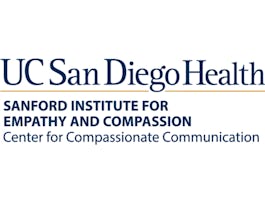In this course, you’ll learn how serious and life-threatening illnesses often affect emotional and spiritual well-being. Illnesses can increase stress as patients and families learn to live with a “new normal” that may often focus on illness. You’ll learn how to tell when normal sadness (or grief) becomes something more serious and needs to be addressed. People with serious illnesses also have social concerns as their family, friends and community support system becomes stretched, and sometimes fails. We’ll talk about resources and skills you can use to help support patients and families. You’ll learn about advance care planning, that includes shared decision-making, setting goals of care, and writing down plans for care.


Psychosocial and Spiritual Aspects of Palliative Care
This course is part of Palliative Care: It's Not Just Hospice Anymore Specialization
Taught in English
Some content may not be translated



Instructors: Regina Fink
4,213 already enrolled
Included with 
Course
(85 reviews)
Details to know

Add to your LinkedIn profile
6 quizzes
Course
(85 reviews)
See how employees at top companies are mastering in-demand skills

Build your subject-matter expertise
- Learn new concepts from industry experts
- Gain a foundational understanding of a subject or tool
- Develop job-relevant skills with hands-on projects
- Earn a shareable career certificate


Earn a career certificate
Add this credential to your LinkedIn profile, resume, or CV
Share it on social media and in your performance review

There are 5 modules in this course
In this course, you’ll learn how serious and life-threatening illnesses can affect emotional and spiritual well-being and increase stress on the patient's support network. We’ll talk about resources and skills you can use to help support patients and families. You’ll also learn about advance care planning, which includes shared decision-making, setting goals of care, and writing down plans for care.
What's included
11 videos6 readings1 quiz
In this module, you will learn how to determine if someone is experiencing normal grief about losses with serious illness. You will also learn when feeling sad becomes a more serious problem, like depression, demoralization, or the desire to die. You’ll also learn how caregivers also grieve.
What's included
9 videos5 readings1 quiz
Providing support and care in the last days of life is important. We only have one chance to provide excellent care for this person. Patients and families often feel afraid and overwhelmed. You can help ease suffering when everyday stress becomes unmanageable anxiety. You can also help patients and families understand the dying process; express their preferences for care; manage common symptoms, and provides practical, emotional, spiritual and social support. You can help make serious illness and the last days of life positive and meaningful experiences.
What's included
10 videos7 readings1 quiz
In this lesson, we’ll talk about the difference between spirituality and religion. Then you’ll learn skills for respectful spiritual conversations with patients and family members.
What's included
11 videos5 readings2 quizzes
In this lesson, we will talk about a very important topic that concerns each and every one of us. Advance care planning, shared decision making, goals of care, advocating for those we love and family conversations are central topics we all will run into eventually. What kind of care would we want if we could not speak for ourselves? Who do we want to stand up for us and speak for what we want if we can’t do it ourselves? What are our values and beliefs, what gives us joy, what do we want when time on this earth is limited? Using these principles as the guiding light, goals of care emerge and along with them preferences for treatment. We will look at ways to help facilitate the identification of these goals of care as well as how to help caregivers understand and support their loved ones wishes and desires.
What's included
13 videos8 readings1 quiz
Instructors


Offered by
Recommended if you're interested in Patient Care

University of Colorado System

University of California San Diego

Johns Hopkins University

Stanford University
Why people choose Coursera for their career




Learner reviews
Showing 3 of 85
85 reviews
- 5 stars
89.41%
- 4 stars
10.58%
- 3 stars
0%
- 2 stars
0%
- 1 star
0%
New to Patient Care? Start here.

Open new doors with Coursera Plus
Unlimited access to 7,000+ world-class courses, hands-on projects, and job-ready certificate programs - all included in your subscription
Advance your career with an online degree
Earn a degree from world-class universities - 100% online
Join over 3,400 global companies that choose Coursera for Business
Upskill your employees to excel in the digital economy
Frequently asked questions
Access to lectures and assignments depends on your type of enrollment. If you take a course in audit mode, you will be able to see most course materials for free. To access graded assignments and to earn a Certificate, you will need to purchase the Certificate experience, during or after your audit. If you don't see the audit option:
The course may not offer an audit option. You can try a Free Trial instead, or apply for Financial Aid.
The course may offer 'Full Course, No Certificate' instead. This option lets you see all course materials, submit required assessments, and get a final grade. This also means that you will not be able to purchase a Certificate experience.
When you enroll in the course, you get access to all of the courses in the Specialization, and you earn a certificate when you complete the work. Your electronic Certificate will be added to your Accomplishments page - from there, you can print your Certificate or add it to your LinkedIn profile. If you only want to read and view the course content, you can audit the course for free.
If you subscribed, you get a 7-day free trial during which you can cancel at no penalty. After that, we don’t give refunds, but you can cancel your subscription at any time. See our full refund policy.



